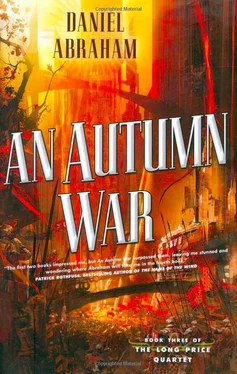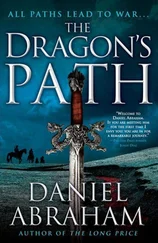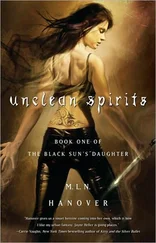Daniel Abraham - Autumn War
Здесь есть возможность читать онлайн «Daniel Abraham - Autumn War» весь текст электронной книги совершенно бесплатно (целиком полную версию без сокращений). В некоторых случаях можно слушать аудио, скачать через торрент в формате fb2 и присутствует краткое содержание. Жанр: Фэнтези, на английском языке. Описание произведения, (предисловие) а так же отзывы посетителей доступны на портале библиотеки ЛибКат.
- Название:Autumn War
- Автор:
- Жанр:
- Год:неизвестен
- ISBN:нет данных
- Рейтинг книги:4 / 5. Голосов: 1
-
Избранное:Добавить в избранное
- Отзывы:
-
Ваша оценка:
- 80
- 1
- 2
- 3
- 4
- 5
Autumn War: краткое содержание, описание и аннотация
Предлагаем к чтению аннотацию, описание, краткое содержание или предисловие (зависит от того, что написал сам автор книги «Autumn War»). Если вы не нашли необходимую информацию о книге — напишите в комментариях, мы постараемся отыскать её.
Autumn War — читать онлайн бесплатно полную книгу (весь текст) целиком
Ниже представлен текст книги, разбитый по страницам. Система сохранения места последней прочитанной страницы, позволяет с удобством читать онлайн бесплатно книгу «Autumn War», без необходимости каждый раз заново искать на чём Вы остановились. Поставьте закладку, и сможете в любой момент перейти на страницу, на которой закончили чтение.
Интервал:
Закладка:
The physician was right. It would he easy to fix one thing, if there were only one thing wrong. But there were so many was to break something so delicate and so complex. Even the act of making one thing right seemed destined to undo something else. And he was too tired and too confused to say whether one way of being wounded was better than another.
There were so many ways to be wrong.
There were so many ways to break things. hlaati felt the thought fall into place as if it were something physical. It was the moment he was supposed to shout, to stand tip and wave his hands about, possessed by insight as if by a demon. But instead, he sat with it quietly, as if it was a gem only he of all mankind had ever seen.
He'd spent too much time with Heshai's binding. Removing-thePart-That-Continues had been made for the cotton trade-pulling seeds from the fiber and speeding it on its way to the spinners and the weavers and feeding all of the needle trades. But there was no reason for h Iaati to he restricted by that. He only needed a way to break Galt. To starve them. To see that no other generation of Galtic children ever saw the world.
It wasn't Seedless he needed. It was only Sterile. And there were any number of ways to say that.
He sank lower into the water as the sense of relief and peace consumed him. Destroying-the-Part- That-Continues, he thought as the little waves touched his lips. Shattering-the-Part-"That-Continues. Crushing it. Rotting it. Corroding it.
Corrupting it.
In his mind, Galt died. And he, Maati Vaupathai, killed it. What, he asked himself, was victory in a single battle compared with that? Otah had saved the city. Nlaati saw now how he could save everything.
21
Sinja woke, stiff with cold, to the sound of chopping. Outside the tent, someone with a hand axe was breaking the ice at the top of the barrels. It was still dark, but morning was always dark these days. He kicked off his blankets and rose. The undyed wool of his inner robes held a hit of the heat as he pulled on first one outer robe and then another with a wide leather cloak over the top that creaked when he fastened the wide hone broochwork.
Outside his tent, the army was already breaking camp. Columns of smoke and steam rose from the wagons. Horses snorted, their breath pluming white in the light of a falling moon. In the southeast, the dawn was still only a lighter shade of black. Sinja walked to the cook fire and squatted down beside it, a howl of barley gruel sweetened with winepacked prunes in his hands. The heat of it was better than the taste. Wine could do strange things to prunes.
The army had been marching for two and a half weeks. At a guess, there were another three before they reached Machi. If there was no storm, Sinja guessed they would lose a thousand men to frostbite, most of those in the last ten days. He squinted into the dark, implacable sky and watched the faintest stars begin to fade. 't'here would still be over nine thousand men. And every man among them would know that this battle wasn't for money or glory. Or even for love of the general. If by some miracle Otah turned the Galts back from the city, they would die scattered in the frozen plains of the North.
This battle would be the only time in the whole benighted war that the Galts would go in knowing they were fighting for their lives.
"You want more?" the cook asked, and Sinja shook his head. Around him, the members of his personal guard were moving at last. Sinja didn't help them break down the camp. He'd left most of the company behind in Tan-Sadar. They were, after all, on a deadly stupid march that, with luck, would end with them sacking their own hones. It wasn't duty that could be asked of a green recruit of his first campaign. Sinja had taken time handpicking this dozen to accompany him. 't'here wasn't a man among them he liked.
The last tent was folded, poles bound together with their leather thongs, and put on the steam wagon. The fires were all stamped out, and the stin made its tardy appearance. Sinja wrapped the leather cloak closer around his shoulders and sighed. This was a younger man's game. If he'd been as wise as the average rat, he'd be someplace warm and close now, with a good mulled wine and a plate of venison in mint sauce. The call sounded, and he began the walk north. Cold numbed his face and made his cars ache. The air smelled of dust and smoke and horse dung-the miasma of the moving army. Sinja kept his eyes to the horizon, but the only clouds were the high white lace that did little but leach blue from the sky; there was no storm coming today. And still the dusting of snow that had fallen in the last weeks hadn't melted and wouldn't before spring. The world was pale except where a stone or patch of ground stood free of snow. "There it was black.
Ile put one foot in front of the other, his mind growing empty with the rhythm. His muscles slowly warmed. The pain retreated from his ears. With enough effort, the air became almost comfortable. The sun rose quickly behind him, as if in a hurry to finish its day's passage and return the world to darkness.
When he paused to relieve himself on a tree-his piss steaming in its puddle-he took off the leather cloak. If he got too warm, he'd start to sweat. Soaking through his inner robes was an invitation to death. He wondered how many of Balasar's men knew that. With his sad luck, all of them.
They wouldn't see a low town today. They had overrun one yesterday-the locals surprised to find themselves surrounded by horsemen intent on keeping any word from slipping out to the North. 'T'here would he another town in a day or two. If Sinja was lucky, it might mean fresh meat for dinner. The rations set aside by the townsmen to see them through the winter might feed the army for as much as half a day.
They paused at midday, the cooks using the furnaces of the steam wagons to warm the bread and boil water for tea. Sinja wasn't hungry but he ate anyway. The tea was good at least. Overbrewed and bitter, but warm. He sat on the broad back of a steam wagon, and was prepar ing himself for the second push of the day and estimating how many miles they had covered since morning when the general arrived.
Balasar rode a huge black horse, its tack worked with silver. As small as the man was, he still managed to look like something from a painting.
"Sinja-cha," Balasar Cice said in the tongue of the hhaiem. "I was hoping to find you here.,,
Sinja took a pose of respect and welcome.
"I'd say winter's cone," the general said.
"No, Balasar-cha. If this was real winter, you could tell because we'd all be dead by now."
Balasar's eyes went harder, but his wry smile didn't fade. It wasn't anger that made him what he was. It was determination. Sinja found himself unsurprised. Anger was too weak and uncertain to have seen them all this far.
"I'd have you ride with us," the general said.
"I'm not sure Eustin-cha would enjoy that," Sinja said, then switched to speaking in Galtic. "But if it's what you'd like, sir, I'm pleased to do it."
"You have a horse?"
"Several. I've been having them walked. I've got good enough fighters among my men, but I can't speak all that highly of them as grooms. A horse with a good lather up in this climate and with these boys to care for it is going to he tomorrow night's dinner."
"I have a servant or two I could spare," Balasar said, frowning. Sinja took a pose that both thanked and refused.
"I'd take the loan of one of your horses, if you have one ready to ride. Otherwise, I'll need to get one of mine."
"I'll have one sent," Balasar said. Sinja saluted, and the general made his way back to the main body of the column. Sinja had just washed down the last of the bread with the dregs of his tea when a servant arrived with a saddled brown mare and orders to hand it over to him. Sinja rode slowly past the soldiers, grim-faced and uncomfortable, preparing for their trek or else already marching. Balasar rode just after the vanguard with Dustin and whichever of his captains he chose to speak with. Sinja fell in beside the general and made his salute. Balasar returned it seriously. h, ustin only nodded.
Читать дальшеИнтервал:
Закладка:
Похожие книги на «Autumn War»
Представляем Вашему вниманию похожие книги на «Autumn War» списком для выбора. Мы отобрали схожую по названию и смыслу литературу в надежде предоставить читателям больше вариантов отыскать новые, интересные, ещё непрочитанные произведения.
Обсуждение, отзывы о книге «Autumn War» и просто собственные мнения читателей. Оставьте ваши комментарии, напишите, что Вы думаете о произведении, его смысле или главных героях. Укажите что конкретно понравилось, а что нет, и почему Вы так считаете.










